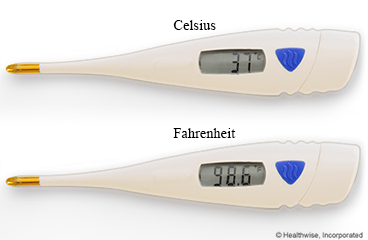
Your Care Instructions
A fever is a high body temperature.
Fever is the body's normal reaction to infection and other illnesses, both minor and serious. Fevers help the body fight infection. In most cases, fever means your child has a minor illness. Often you must look at your child's other symptoms to determine how serious the illness is.
Children with a fever often have an infection caused by a virus, such as a cold or the flu. Infections caused by bacteria, such as strep throat or an ear infection, also can cause a fever.
Follow-up care is a key part of your child's treatment and safety. Be sure to make and go to all appointments, and call your doctor if your child is having problems. It's also a good idea to know your child's test results and keep a list of the medicines your child takes.
How can you care for your child at home?
- Don't use temperature alone to judge how sick your child is. Instead, look at how your child acts. Care at home is often all that is needed if your child is:
- Comfortable and alert.
- Eating well.
- Drinking enough fluid.
- Urinating as usual.
- Starting to feel better.
- Dress your child in light clothes or pajamas. Don't wrap your child in blankets.
- Give acetaminophen (Tylenol) to a child who has a fever and is uncomfortable. Children older than 6 months can have either acetaminophen or ibuprofen (Advil, Motrin). Do not use ibuprofen if your child is less than 6 months old unless the doctor gave you instructions to use it. Be safe with medicines. For children 6 months and older, read and follow all instructions on the label.
- Do not give aspirin to anyone younger than 20. It has been linked to Reye syndrome, a serious illness.
- Be careful when giving your child over-the-counter cold or flu medicines and Tylenol at the same time. Many of these medicines have acetaminophen, which is Tylenol. Read the labels to make sure that you are not giving your child more than the recommended dose. Too much acetaminophen (Tylenol) can be harmful.
When should you call for help?
Call 911 anytime you think your child may need emergency care. For example, call if:
- Your child seems very sick or is hard to wake up.
Call your doctor now or seek immediate medical care if:
- Your child seems to be getting sicker.
- The fever gets much higher.
- There are new or worse symptoms along with the fever. These may include a cough, a rash, or ear pain.
Watch closely for changes in your child's health, and be sure to contact your doctor if:
- The fever hasn't gone down after 48 hours. Depending on your child's age and symptoms, your doctor may give you different instructions. Follow those instructions.
- Your child does not get better as expected.
Where can you learn more?
Go to http://www.healthwise.net/patientEd
Enter L960 in the search box to learn more about "Fever in Children 3 Months to 3 Years: Care Instructions".
Current as of: April 30, 2024
Author: Ignite Healthwise, LLC Staff
Clinical Review Board
All Healthwise education is reviewed by a team that includes physicians, nurses, advanced practitioners, registered dieticians, and other healthcare professionals.

